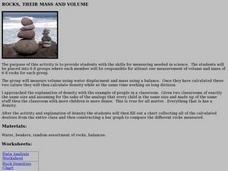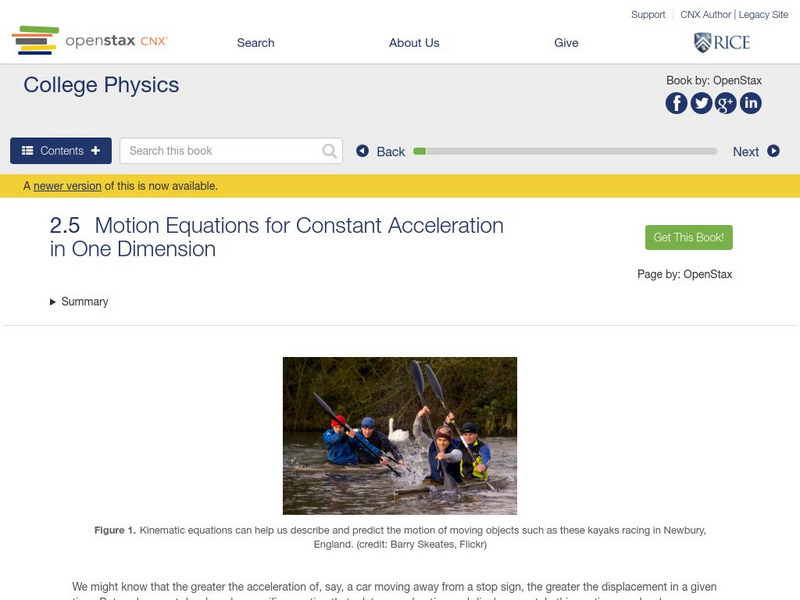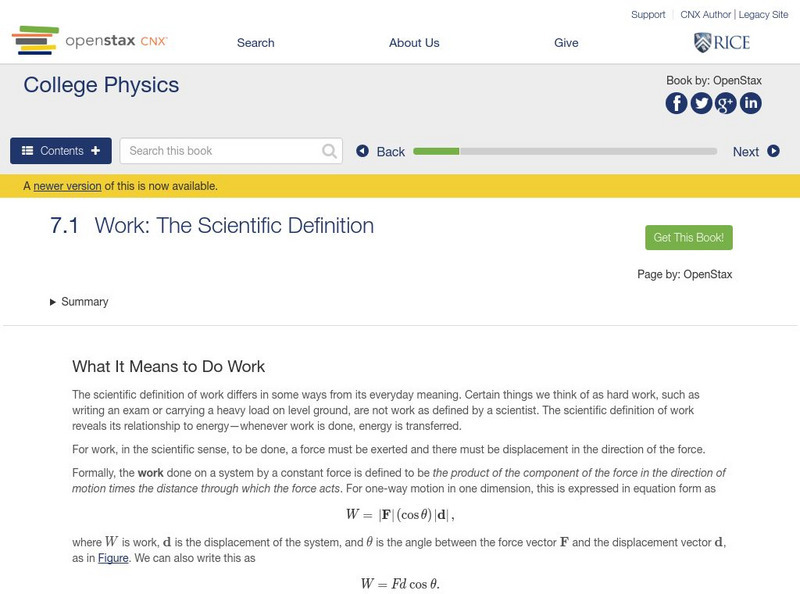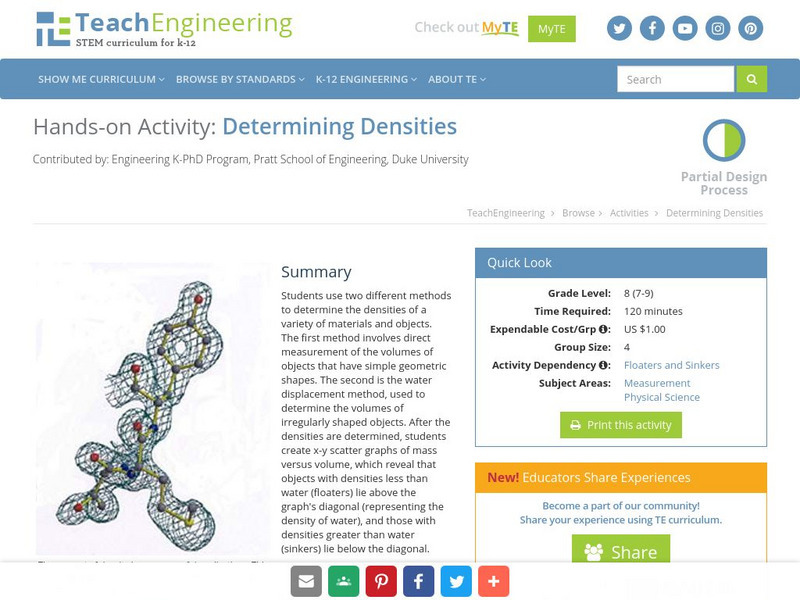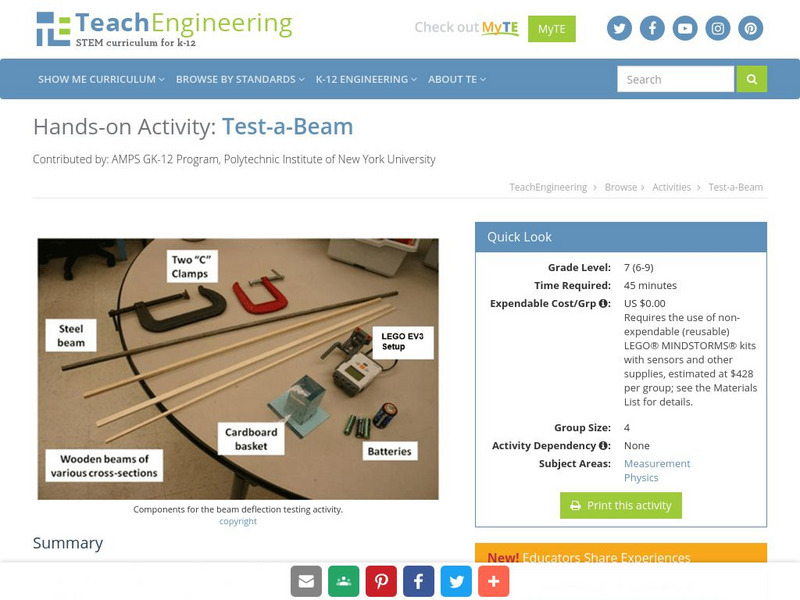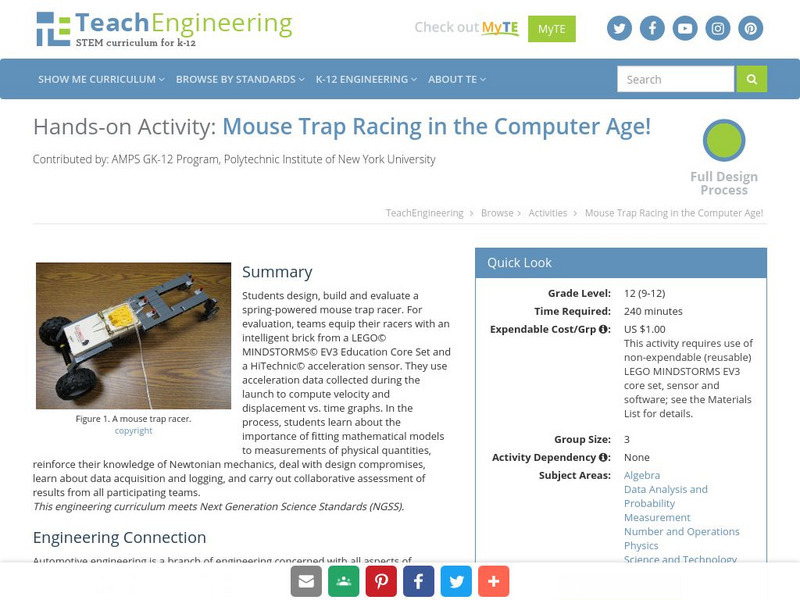Curated OER
Vectors
Students differentiate distance and displacement. In this physics lesson plan, students use formulas to calculate for displacement. They draw vectors using the grid.
Curated OER
Buoyancy
In this buoyancy worksheet, students review Archimedes principle and the difference between positive, negative, and neutral buoyancy. This worksheet has 1 fill in the blank and 7 short answer questions.
Curated OER
Viscosity and Density
In this viscosity and density pre-lab worksheet, learners define these two terms and determine how to find relative viscosity and the volume of an irregular shaped solid. This worksheet has 13 short answer questions.
Curated OER
Physics Motion
In this physics worksheet, high schoolers identify and locate vocabulary terms related to high school physics motion, including projectile motion. There are 46 words located in the puzzle.
Curated OER
Biology: Lung Capacity
Students perform experiments to determine their lung capacity and respiration rate. After choosing and performing one of two methods to discover lung capacity, they measure their respiratory rates and assess conditions that affect them....
Curated OER
Buoyancy
Students look at clippings of boats. They are able to define the following terms displacement, and density. Students construct a clay boat. After they complete their clay boat students answer questions about their clay boats.
Curated OER
Rocks, Their Mass and Volume
Students measure volume using water displacement and mass using a balance. Once they have calculated these two values they will then calculate density while at the same time working on long division. After the activity and explanation of...
Curated OER
Pendulum Motion Experiments
Students experiment with simple pendulums to determine the validity of an equation for all angles. Students discover the usefulnes and limitations of approximations in science. Using spreadhseets and a java applet, students observe the...
Curated OER
Motion Capture and Analysis
Students capture the serve motion of a tennis player with a digital or video camera. Using transparencies or a software package, analyze the speed, acceleration, displacement and time of the racquet head and ball in the tennis stroke.
National Endowment for the Humanities
Neh: Edsit Ement: Anishinabe Ojibwe Chippewa: Culture
Though written for grades 3-5, this lesson plan can be easily changed to help learners of all ages learn about the Chippewa people. Additional resources provide historical, cultural, and geographical facts concerning this Native American...
Science Buddies
Science Buddies: Moving Water With the Archimedes Screw Pump
Amaze your friends and family by moving water with just a few turns of your wrist, this is known as an Archimedes screw. In this science project, you will build a very simple Archimedes screw, to transfer water from a low-lying location...
Science Education Resource Center at Carleton College
Serc: Irregular Shaped Object Lab Test
Students will determine what an unknown substance is by finding mass, volume, displacement, and density of an object. Students will also create a report which will require them to read a graph, interpret data, calculate averages, and...
Georgia Department of Education
Ga Virtual Learning: Ap Physics 1: One Dimensional Kinematics
Using only two of our fundamental units, time and displacement students will build a framework to predict the motion of objects, starting with one dimensional motion.
Khan Academy
Khan Academy: What Is Acceleration?
Provides definitions, examples, and formulas for acceleration.
Khan Academy
Khan Academy: What Are Velocity vs. Time Graphs?
Graphs and examples help explain what the vertical axis, slope, and area represent on a velocity-time graph.
Khan Academy
Khan Academy: What Are the Kinematic Formulas?
Featured are the kinematic formulas or main equations you can use to analyze situations with constant acceleration.
OpenStax
Open Stax: Physics: Motion Equations for Constant Acceleration in One Dimension
In this interactive module, students will calculate displacement of an object that is not accelerating, given initial position and velocity. They will also calculate final velocity of an accelerating object, given initial velocity,...
OpenStax
Open Stax: Time, Velocity and Speed
In the following interactive module, students will begin to explain the relationships between instantaneous velocity, average velocity, instantaneous speed, average speed, displacement, and time. They will calculate velocity and speed...
OpenStax
Open Stax: Work: The Scientific Definition
In the following interactive students will begin to explain how an object must be displaced for a force on it to do work. They will also explain how relative directions of force and displacement determine whether the work done is...
University of Colorado
University of Colorado: Ph Et Interactive Simulations: Hooke's Law
Stretch and compress springs to explore the relationships between force, spring constant, displacement, and potential energy. Investigate what happens when two springs are connected in series and parallel.
TeachEngineering
Teach Engineering: Taking the Boat to Manaus
In this activity, the students will apply the concepts they learned regarding mass, volume and density in the previous activities to design a boat.
TeachEngineering
Teach Engineering: Determining Densities
Students will use two different methods to determine the densities of a variety of materials and objects. The first method involves direct measurement of the volumes of objects that have simple geometric shapes, while the second uses the...
TeachEngineering
Teach Engineering: Test a Beam
Students measure different types of small-sized beams and calculate their respective moments of inertia. They compare their calculations to how much the beams bend when loads are placed on them, gaining insight into the ideal geometry...
TeachEngineering
Teach Engineering: Mouse Trap Racing in the Computer Age!
Students design, build and evaluate a spring-powered mouse trap racer. For evaluation, teams equip their racers with an intelligent brick from a LEGO MINDSTORMS NXT Education Base Set and a HiTechnic acceleration sensor. They use...








